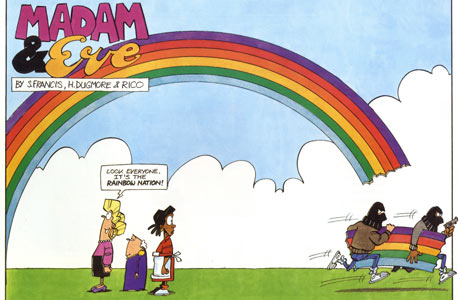
As South Africa was disentangling itself from apartheid 20 years ago, a white housewife confessed: "Forgive me, Father, for I have sinned. For years I've been paying my maid Eve only 10 rand for a full day's work." A voice behind the confessional grille replied: "I see. Is she available Tuesdays?''
The scene is from Madam & Eve, a celebrated newspaper cartoon that since 1992 has accompanied South Africans through four national elections, a football World Cup, the HIV pandemic and bread-and-butter issues such as crime, race relations, corruption and "bling". If there was a way to measure the impact of laughter on the country's peaceful transition, Madam & Eve would bust the clap-o-meter.
"The tone of the cartoon has followed the peaks of optimism and troughs of pessimism South Africa has been through. We have tremendous highs and lows," said the illustrator, Enrico "Rico" Schacherl, 46, who has just waded through two decades of Madam & Eves for a book, Twenty, published in South Africa by Jacana Media.
His storyboarding partner, Stephen Francis, is a New Yorker who moved to South Africa as a newlywed in 1988. Francis, now 60, said: "In the beginning, this was a very conservative country. Now you get away with a lot more than you would in the States."
President Jacob Zuma would like it otherwise. Satirists have seized on the polygamous president's image, which is laced with lingering whiffs of corruption, a rape acquittal in 2006, a bling-prone entourage and a penchant for expensive home improvements.
Last month the state broadcaster SABC blocked an animated television commercial for a fish-and-chip company. The advert reportedly parodied Zuma's taste for large female coteries and was set at Nkandla, the presidential compound that has recently been at centre of controversy after receiving a security upgrade at the taxpayers' expense.
In October, Zuma backed out of a long-running defamation suit against Jonathan Shapiro, known as Zapiro, over a 2008 newspaper cartoon showing him loosening his trousers as he stood in front of a spreadeagled Lady Justice. Earlier this year the artist Brett Murray's The Spear, depicting Zuma with his genitals exposed, led to a legal flurry and an attempt to have the painting classed as pornography.
The stingy Madam Gwen and her savvy but underpaid domestic worker, Eve, are both far too morally upright to allow sexual insinuations into their strip. Rico and Francis have never been sued: "If we bludgeoned the message it would impact on the characters. We want engagement and empathy so we can deliver the message through characters people love," said Rico.
While the marriage that brought Francis to South Africa did not last, his ex-mother-in-law, Gwen, provided the name and inspiration for Madam. "I thought it was wonderful staying with someone whom everyone called Madam. In the US that would mean something quite different. I was fascinated by her relationship with Grace, her domestic worker, who was privy to all the family secrets and at the same time was considered a kind of stranger.
"When the opportunity arose to do a cartoon for the Weekly Mail, it seemed a great idea to view the changing South Africa through the eyes of these two women from different backgrounds," said Francis, who also writes scripts for horror movies and romantic comedies.
Madam & Eve still appears in the Weekly Mail's successor, the Mail & Guardian. Annuals have been published in French, Danish, Swedish and Finnish. A daily version is supplied to the Namibian and 12 South African newspapers. It has been made into a television sitcom and there are plans for a musical and an animated television series.
While South Africa has changed over the past 20 years, Madam & Eve is proof that much has remained the same. One of the cartoonists' favourite drawings, from 1996, shows Madam and Eve looking on as two hooded criminals run off with a slice of a rainbow, symbolising the Rainbow Nation. "That drawing would be the same if I did it today, except the thieves would be wearing suits. They would be politicians," said Rico.
None of the characters have aged and Gwen's reactionary Mother Anderson remains 80. Despite the introduction of department of labour guidelines stipulating a minimum daily wage of R78.80 (£5.61) for South Africa's estimated 1.5 million domestic workers, Eve is still battling for a pay rise.
Rico claimed he did not know what her salary was today, but added evasively: "She gets royalties." In response to a request from the Guardian, the South African Reserve Bank calculated that, adjusted to inflation, the R10 Eve was paid in 1992 was equivalent to R35.34 (£2.52) today.
• This article was amended on 11 December to correct Stephen Francis' surname







